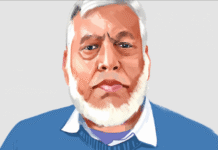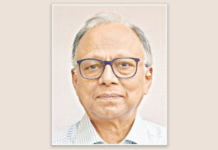So it took five years for our politicians to come up with a choice for our people. Either you support the concept of a caretaker government, which is controversial and, in our own country, has been discredited in the past. Or you accept a so-called interim government to run the country’s affairs for 90 day after the dissolution of the parliament. In the case of an interim government, it would be run by an 11-member cabinet with the current prime minister as the interim head. Ostensibly, the responsibilities of both these types of government will revolve round taking routine decisions and ensuring the holding of a free, fair election under a spruced up National Election Commission.
The people have very few days left to decide on either of these two forms of government. But the point is clearly not that. The ruling AL is supporting the interim government system and the prime minister has already indicated who are likely to have a place in this cabinet. The leader of the opposition, Khaleda Zia, remains insistent on setting up of a caretaker government. However, she has not indicated who will run this form of government. But we do know that those who may sit in this cabinet would be non-political, non-partisan persons who are held in high esteem in our society. These 11 members will do the same duties as the interim government and will hand over power after 90 days to a duly elected government.
The sticking point remains the nature and character of these 11 persons who will be running the government. Khaleda Zia is not particularly choosy about the 10 persons who will be in the cabinet. But she would on no account accept a political person, especially the present prime minister, to lead this caretaker government. To her, this would mean that the neutrality of this government would be compromised.
Both forms of government have their supporters and detractors. There has been misuse and abuse of either or both of the systems. There is immense trust deficit between these two leaders and their close associates. It is not so between the rank and file of these two big parties. The caretaker government in the immediate past had done things that were not in its writ. When it failed to do the task it was meant to, its tenure was arbitrarily extended for more than the admissible time. After two and half years it was finally persuaded to hold a free, fair election, which brought in the present government.
Now that the Parliament is in its penultimate session, all the political parties have a small window of opportunity to discuss and arrive at a consensus on this sensitive matter. But as the clock ticks away, this window is closing. The prime minister, under the present circumstances, is not likely to change her mind. The wish of the people will not find its reflection in the arrangements for the election. Political forces may unleash their strength on the streets and the industrial zones. Uncertainty and total chaos could prevail to the detriment of all.
There is no doubt that 30% of the electorate are die-hard Awami Leaguers. They would, without any questioning, support the system of interim government as proposed by the prime minister. Similarly, the opposition BNP has 30 % of the electorate who swear by the caretaker form of government. That leaves 40% of the electorate who are yet undecided. However, as days pass by and as the AL becomes too insistent on the interim government system, the number of those in favour of the caretaker system is growing, some say even by leaps and bounds.
The prime minister needs to take a political decision of great import now. She needs to consult her senior advisers and decide whether she will continue on her present path of installing an interim government with her as the leader to oversee the coming elections or she will do something out of the box. This would be to immediately pass an amendment to the constitution and allow the holding of a national referendum on the issue of interim or caretaker government. She needs to strengthen her hand by listening to what the people have to say. Admittedly, a national referendum will cause some delay to the holding of the next national elections, but a special provision could be made in the amendment for meeting this extraordinary situation.
The Court had given the option that two subsequent elections could be held under a caretaker government. The prime minister had taken the view of the people and had listened to what they and the highest Court had to say. She has not moved an inch from her previous stance. At the same time, she followed what the people advised. She will no doubt make the electorate happy as they would know that here was a leader who gives importance to the views of the people before jumping from the frying pan to the fire. This could indeed lead the people to vote for the Awami League in droves for the coming elections.
A great American thinker had once said: “Leadership has a harder job to do than choose sides. It must bring sides together.” This is what the prime minister needs to do now. She has to move swiftly on this after her return from the UN General Assembly session. She has to use her leadership talents to bring the nation together. Her father, Bangabandhu, did so very successfully when the need of the hour was to fight the enemy unitedly. Why can’t she do the same now?
The writer is a former ambassador and a commentator on current affairs.
E-mail: ashfaque303@gmail.com
Source: The Daily Star










The plea of the PM and her chorus group that the constitution does give scope to administer any form of govt with ‘unelected’ persons, sounds weird and hollow when she is running her govt with as many as six advisers none of who are elected. Even all the Zilla Proshashaks (District Administrators) are not elected. So it’s nothing but her extreme highhandedness and arrogance that she is running with her obstinacy in the face of public opinion which by many sample but authentic surveys is in favor of holding the general election under a non-party CTG/interim govt. We do not know what is in her mind, really and therefore, we are very apprehensive about the future of our country.